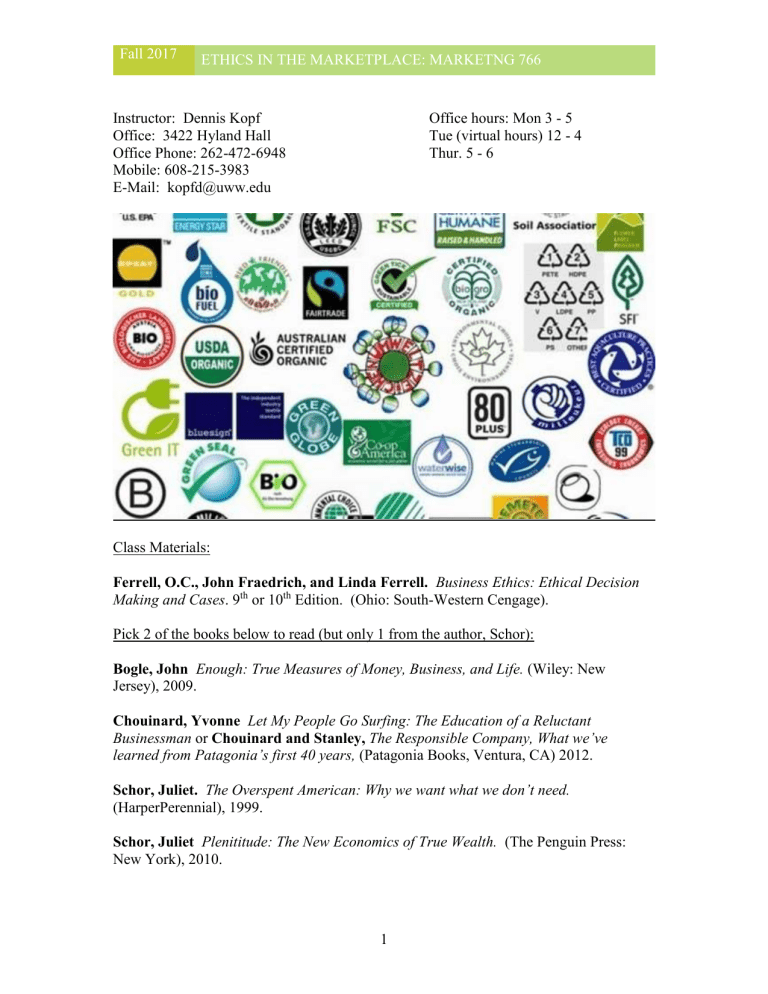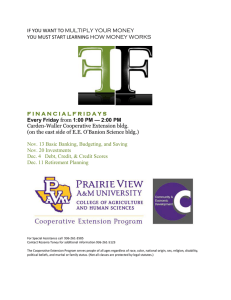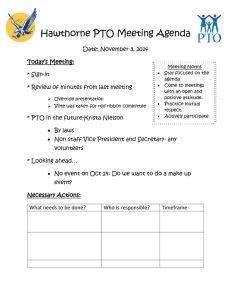
Fall 2017 ETHICS IN THE MARKETPLACE: MARKETNG 766 Instructor: Dennis Kopf Office: 3422 Hyland Hall Office Phone: 262-472-6948 Mobile: 608-215-3983 E-Mail: kopfd@uww.edu Office hours: Mon 3 - 5 Tue (virtual hours) 12 - 4 Thur. 5 - 6 Class Materials: Ferrell, O.C., John Fraedrich, and Linda Ferrell. Business Ethics: Ethical Decision Making and Cases. 9th or 10th Edition. (Ohio: South-Western Cengage). Pick 2 of the books below to read (but only 1 from the author, Schor): Bogle, John Enough: True Measures of Money, Business, and Life. (Wiley: New Jersey), 2009. Chouinard, Yvonne Let My People Go Surfing: The Education of a Reluctant Businessman or Chouinard and Stanley, The Responsible Company, What we’ve learned from Patagonia’s first 40 years, (Patagonia Books, Ventura, CA) 2012. Schor, Juliet. The Overspent American: Why we want what we don’t need. (HarperPerennial), 1999. Schor, Juliet Plenititude: The New Economics of True Wealth. (The Penguin Press: New York), 2010. 1 Fall 2017 ETHICS IN THE MARKETPLACE: MARKETNG 766 Speth, James Gustave. The Bridge at the Edge of the World: Capitalism, the Environment, and Crossing from Crisis to Sustainability. (Yale University Press), 2008 Other materials are available through library sources at UWW or in the content area of D2L. Course Objectives: At the completion of the course, students will have had the opportunity to: examine the responsibilities that customers, organizations and governments have to each other, disadvantaged groups and the environment identify relevant stakeholders and their expectations in diverse situations apply ethical theories and concepts to practical business situations domestically and internationally generate and defend alternative actions for problems with ethical implications discuss issues surrounding marketing topics such as marketing to vulnerable groups, advertising, pricing, and product safety write objective persuasive arguments concerning ethical situations enter into numerous discussions with other students on case materials find examples of businesses that act responsibly and still maintain profitability articulate their own guiding ethical philosophy for consumption and the role of business in society Course Description: Ethics in the Marketplace will emphasize the complex challenges of relationships between organizations and their external environments, primarily those relationships with customers, competitors, suppliers and society. The course will identify ethical principles, and students will apply them to real world situations in the areas of target markets, pricing, retail strategies, product safety, and international settings. Discussions and written papers will be required. Grading Criteria: Exams Case Paper 1 Case Paper 2 Discussions Total 20% 25% 25% 30% 100% 2 Fall 2017 ETHICS IN THE MARKETPLACE: MARKETNG 766 All materials for which students expect any credit must be submitted by the due date of the final exam. At the end of the semester, students’ course grades will be based on the following standard: Average of: 93-100% 90-92.9% 88-89.9% 80-87.9% 80-81.9% 78-79.9% 70-77.9% 60-69% < 60% A AB+ B BC+ C D F Examinations: You are required to complete three multiple-choice tests to demonstrate your understanding of the textbook, Business Ethics: Ethical Decision Making and Cases. (20% of grade). You can take each quiz twice and I will take your highest of the two quiz scores for your grade from each quiz. The questions are randomly selected from a test bank, so don’t expect the same questions twice. The tests are open-textbook, and open note, but you won’t have enough time to look up every answer. You will have to read and comprehend the material beforehand. Schedule of Examinations: Quiz 1: Chapters 1 - 2 Ferrell, Opens Nov. 1 closes Dec. 1 at midnight. Quiz 2: Chapters 3 - 4 Ferrell, Opens Nov. 1 closes Dec. 1 at midnight. Quiz 3: Chapters 5 - 6 Ferrell, Opens Nov. 1 closes Dec. 10 at midnight. Writing Assignments: Excellent writing abilities are imperative to success in business and this is a skill that you can expect to improve during this course. This course can be considered writing intensive and I expect graduate level accomplishment in writing. I will grade not only on your mastery of the content, but I also expect the correct use of grammar, spelling and style. If you know your writing is weak, then consider having a friend proofread your paper and/or contact the Academic Support Center for an appointment, http://www.uww.edu/acadsupport/tutorial/. This is a free service provided by the University. Finally, in the content section, you will see an extra section called Writing. Everyone should go here to look at resources that will help you to improve your writing. 3 Fall 2017 ETHICS IN THE MARKETPLACE: MARKETNG 766 WRITING RUBRIC 1. Quality of Introduction/ Conclusion Sub-score: 2. Paper has a Focus or Thesis Good Enough – 2 Functional but limited introduction and conclusion. Not Good Enough – 1 □ Truncated or absent introduction; redundant or abrupt. □ Explicitly and fully addresses the assignment. The central idea/thesis is clear, compelling, original, and complex. □ □ Skillful, logical, persuasive support of central idea/ thesis. Unified paragraphs that effectively develop the central argument. Smooth transitions between ideas at sentence and paragraph level. Thesis and ideas are consistently supported by well-chosen evidence. Evidence is smoothly integrated into discussion. Evidence is credible, accurate and presented with an appropriate level of detail. Closely adheres to rules of Standard Written English (grammar, punctuation, spelling). □ □ Sub-score: 3. Writing is organized, concise and coherent □ □ □ Sub-score: 4. Good Use of Supporting Evidence Subscore: 5. Grammar Subscore: WRITING SCORE: (14-15 = A), (11-13 = B), (8-10 = C) (7 or below = D) Very Good – 3 Both introduction and conclusion are effective, engaging, thoughtful. □ □ □ □ Fully addresses assignment but may be oblique in focus. The central idea/ thesis is clear but may be simplistic, obvious or superficial. Generally maintains focus but support of central idea/thesis may be uneven or not fully persuasive. Generally unified paragraphs with occasional gaps in logic. Some weak transitions. Thesis and ideas are generally supported, but there may be gaps or use of irrelevant evidence. Evidence may be unevenly integrated into argument. Evidence may be occasionally inaccurate, too general or too specific. Mostly adheres to rules of Standard Written English but may include some errors. □ □ □ □ □ □ □ □ □ □ □ □ □ □ □ □ □ Only partially addresses the assignment. The central idea /thesis may lack clarity, or be confused or inaccurate. Shifting or lack of focus; weak argument or logic. Disjointed or confusing presentation of ideas within paragraphs. Transitions may be missing. Thin, inappropriate, or absent evidence. Evidence is poorly integrated (lacks signal phrases and follow-up). Evidence is often inaccurate, too general or too specific. Frequent errors in Standard Written English that may impede meaning. Sometimes meaning is impeded due to awkward or non-idiomatic sentences. Often simplistic, inexact or inappropriate word choice or usage. Assignment 1: Greyston Paper Due November 19th For this assignment, you will read the case on Greyston (available in D2L) and answer the following questions: 1. Who are the stakeholders for Greyston? After reading the case, what do you see as the main priorities that need to be addressed? Propose a solution that takes into account the main stakeholders in addressing and balancing these priorities. 2. Do additional research on Benefit Corps. (this section should be at least 2 pages) What are the advantages and disadvantages of Benefit Corps? How has being a Benefit Corp helped Greyston Thrive. What are the marketing advantages of being a Benefit Corp? 4 Fall 2017 ETHICS IN THE MARKETPLACE: MARKETNG 766 Certified B-Corps and Benefit Corps are slightly different and if you want to touch on the difference in your paper that is fine, but otherwise, we will treat them as conceptually the same). http://benefitcorp.net/businesses/benefit-corporations-and-certified-b-corps Name some other successful Benefit Corps. In your estimation, are they a better model for socially responsible firms? Why or why not? I will be looking for thoroughness and thoughtfulness in answering this question and how well you support your arguments/statements with evidence and/or research. Have fun with this project. Benefit Corps are a relatively recent innovation in business organizations and it will be interesting to see how impactful this new business model is in addressing important social issues as time passes or also to see if it is just a passing fad. A successful paper is at least 4 pages 1.5 spaced. Upload your paper to the D2L dropbox by Nov19th at midnight. If you are able to turn in your paper by Nov. 16th, I will award +3% extra credit of by Nov. 17th for +2% extra credit. Assignment 2: Research/Reaction Paper – Paper Due on D2L in two places, the dropbox AND the discussion board. Upload your paper to the D2L dropbox by Dec. 17th at midnight. Post your paper on the Discussion for that week by Tuesday, December 19th. This research paper is different than other papers that you may have written in that your paper will not only be read by me, but also by other members of the class. With this in mind, you will want to make the paper as engaging and interesting as possible so as not to bore your classmates. Some strategies to do this would be to take a unique perspective on the theme you have chosen. Bring in evidence and ideas that others in the class may not have heard about. I will grade your paper based on the following three criteria: 1. Interestingness. Is it written in an engaging style that will be of value for your classmates to read? * A good paper will bring in outside perspectives and research and intermingle this with quotes/evidence of the two books that you have chosen. Use of outside perspectives and research will likely increase the interestingness factor for your fellow classmates. Also, it may be useful to start out using a traditional research paper format and then at some point, halfway through your paper, you can bring yourself into the paper and give your reactions to the new ideas that you have been exposed to. What in your reading and outside research really resonated with you? 2. Thoroughness/Thoughtfulness. Have you shown that you have mastered the reading and engaged with your chosen theme using a nuanced and unique personal perspective? 5 Fall 2017 ETHICS IN THE MARKETPLACE: MARKETNG 766 3. Writing Style. Have you created a well-written and polished work that is easy for your classmates to read and understand? Write your paper generally following one of the themes described below: Theme 1 --- Environmental Consequences of Business Activity Read (Either Plenitude or Bridge at the Edge of the World) and Let my People Go Surfing Consider the dire warnings of Schor’s Plenitude and Speth’s The Bridge at the Edge of the World. Should their warnings be taken seriously? Considering the arguments (and mounting evidence) of environmental degradation that these authors highlight, what should the roles and responsibilities of companies be to correct this situation? (For example, should more companies operate like Patagonia?) What role should government regulation play? What roles do consumers play? Use a stakeholder-theoretic perspective to tackle this complex issue. A good paper will integrate ideas and statistics from the assigned readings with at least four additional research sources. Choose an interesting and engaging mixture of research and personal perspectives to prove your point Theme 2 -- Personal Responsibility Read two of these three: Bogle, Schor (Overspent American), Chouinard Certainly, the Age and Wisdom of Bogle and Chouinard and the in-depth study and knowledge of Schor are readily apparent in these books. How do these books complement each other? Using the perspectives of these books, articulate a personal ethical standard that you would seek to uphold in your life and career. Does this standard include a concept of consumption ethics? Why or Why not? What is enough? To be successful, you will give your opinion, but you will also be backing up the statements that you make with evidence and concepts from the books. Choose an interesting and engaging mixture of research and personal perspectives to prove your point Theme 3 – Synthesis Read any combination of the five books Choose any combination of Questions from Theme 1 and Theme 2. Address them with the books that you have chosen to read. Choose an interesting and engaging mixture of research and personal perspectives to prove your point. DISCUSSIONS Discussion dates are posted within the modules in which they occur. Please check all modules for specific dates. 6 Fall 2017 ETHICS IN THE MARKETPLACE: MARKETNG 766 I will grade the "class topic discussion" portion of the course. You are required to enter every class topic discussion. Your discussion grade will be based on the following variables. 1. The frequency of your comments. Post several times (at a minimum 3 substantative posts) per discussion topic. One line posts probably won’t receive any credit. 2. The timing of your comments. Please try to enter each discussion topic on different days in order to respond to other students’ questions on your comments and to review what others have posted. 3. Try to read at least 1⁄2 of all comments posted in each discussion topic. (I can’t easily grade you on this point, but remember, you only get out of your education what you are willing to put into it!) Course Schedule Oct. 29 – Nov. 4 Module 1 Nov. 5 – Nov. 12 Module 2 Nov. 12 – Nov. 19 Module 3 Nov. 19 – Nov. 26 Module 4 Nov. 26 – Dec. 3 Module 5 Dec. 3 – Dec. 21 Module 6 Important Dates: Nov. 1 Quiz 1, 2 and 3 open Nov. 5 Module 1: Introduce Yourself Discussion Closes Nov. 5 Module 1: Continental Airlines Discussion Closes Nov. 12 Module 2: Monsanto Case Discussion Closes Nov. 19 Module 3: Is Coke a Joke Discussion Closes Nov. 19 Greyston Bakery Case Paper Due to Dropbox Nov. 26 Module 4: Exemplars of CSR Discussion Closes 7 Fall 2017 ETHICS IN THE MARKETPLACE: MARKETNG 766 Dec. 1 Quizzes 1 and 2 Due Dec. 3 Module 5: Global Financial Meltdown Discussion Closes Dec. 10 Quiz 3 Due Dec. 17 Final Case Paper Due to Dropbox Dec. 17 Final Case Paper must be posted to M6 Discussion by midnight Dec. 21 Module 6: Final Case Paper Discussion Closes ASK QUESTIONS! If I have been confusing or some necessary information is missing, please ask me! I like getting to know you, and I would much rather have you ask a question than worrying about whether you are doing something right. I will do my best to get back to you quickly. Also, feel free to call anytime between 9 AM – 10PM. If the question is simple to answer then email, but if you have a more complex question or issue then it is best to call. I don’t mind phone calls at all. It allows me the chance to interact with you and get to know you better. The same applies to meetings. Just email or call and set up an appointment with me or come to my office hours Ethics is an interesting thought provoking topic and I hope that you enjoy it -- so, most importantly, have fun! 8 Fall 2017 ETHICS IN THE MARKETPLACE: MARKETNG 766 UWW STUDENT HONOR CODE As members of the University of Wisconsin-Whitewater College of Business and Economics community, we commit ourselves to act ethically in all aspects of our academic lives. As students, we promise that our work demonstrates the highest integrity. We will not misrepresent our work, nor plagiarize, nor use unauthorized aid to gain a higher academic standing. As we participate in our academic setting, we commit to promoting diversity and professionalism in our classrooms. We encourage participation from all members of our community, showing respect for others’ personal dignity, rights and freedoms. We will value the academic property that is Hyland Hall as well as the property of individuals throughout the UW-Whitewater campus. We choose to endorse this set of values, thereby accepting responsibility for acting by these principles. Adopted by the Dean’s Advisory Council Spring 2015 Legal: The University of Wisconsin-Whitewater is dedicated to a safe, supportive, and nondiscriminatory learning environment. It is the responsibility of all undergraduate and graduate students to familiarize themselves with University policies regarding Special Accommodations, Academic Misconduct, Religious Beliefs Accommodation, Discrimination, and Absence for University Sponsored Events. For details, please refer to the Undergraduate and Graduate Timetables; the Rights and Responsibilities section of the Undergraduate Bulletin; the Academic Requirements and Policies and the Facilities and Services sections of the Graduate Bulletin; the Student Academic Disciplinary Procedures (UWS Chapter 14); and the Student Nonacademic Disciplinary Procedures (UWS Chapter 17). 9

